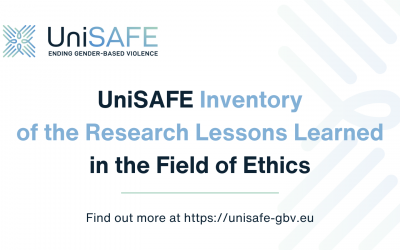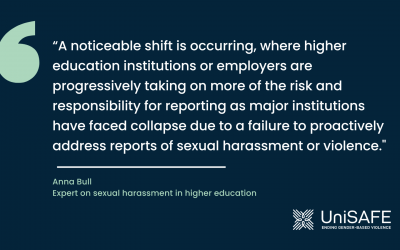The report summarizes the analysis of qualitative research data gathered from 54 individual interviewees about the experiences and/or witnessing of gender-based violence in academia and their impact on individuals and research performing organisations. A qualitative approach was chosen to collect diverse insights on the experiences, perceptions and interpretations of people whose voices are not often heard. The semi-structured interviews were conducted online in the period of February-May 2022.
Key Findings
Prevalence of Gender-Based Violence in research performing Organisations
Findings on patterns of incidents, victims and perpetrators
Intersecting inequalities in terms of gender and race, ethnicity or migration status significantly increase the risks of experiencing gender-based violence.
The analysis implies that women are more likely to experience various forms of gender-based violence in academia. Likewise, LGBTQI+, race and migrant status, working on temporary contracts and physical/mental disability are factors that may increase the risk of facing similar issue.
The results also suggest that perpetrators are mostly men in a supervisory role and/or occupy leading academic or management position in research performing organisations.
Prevalence of the forms of gender-based violence and their interconnectedness in research-performing organisations
Physical violence is almost absent in the stories of the interviewees.
Data analysis of the interviews revealed that manifestations of gender-based violence are usually not single and isolated but rather other forms such as psychological violence, gender harassment, sexual harassment and economic violence.
Institutional responses
Many interviewees who experienced or witnessed gender-based violence, tried to find a solution to cope. Almost half of the interviewees informed informally their supervisors or other staff of the university’s administration about incidents.
Types of response to incidents presented by interviewees
Most research performing organisations do not tackle the problems of gender-based violence seriously and effectively.
The analysis shows that no response was provided to the victim in almost half of the cases reported either formally or informally; interviewees who reported the issue described that their institutions made efforts to hide incidents of gender-based violence. As for the ones who chose to avoid complaining, they explained that their intentions were to protect themselves from being identified as troublemakers.
Reflections on Prevalence, Prevention, Protection, Prosecution, Provision of services, Partnership and Policies (7Ps)
The UniSAFE project adopts a holistic 7Ps model to collect data on the prevalence of the diverse forms of gender-based violence and analyses the role of research performing organisations in preventing, protecting, prosecuting, and providing services, supported by partnership and policies.
Institutional contexts of research performing organisations facilitating gender-based Violence
The dependence on the perpetrator leaves the victims in a relatively powerless position.
The interview analysis shows that discriminatory practices, men’s domination in leadership positions, power inequalities and gender stereotypes facilitate a hostile environment that tolerates gender-based violence in research organisations. In these organisational contexts, victims tend to avoid reporting because of fear of exposure to more serious violence or negative economic/financial and mental/well-being harm.
Consequences of gender-based violence for individuals and research performing organisations
Consequences for the victims and the perpetrators
Gender-based violence negatively impacts the victims while the majority of perpetrators rarely face any consequences.
The research findings suggest that incidents of gender-based violence and inadequate responses had negative consequences for the victims’ physical and mental health, well-being and professional career development. In contrast, the perpetrators did not receive any sanctions. In some cases, they were promoted and remained respected members of the research performing organisation.
Consequences for the research performing organisations
There is a lack of proactiveness from the institution.
The report drew the attention on the negative consequences that were mainly related to the loss of the employees or students, negative impact on reputation of research performing organisations and/or financial loss. As for the few positive consequences, they mainly identified the establishment of new rules and guidelines, development of training for staff members, as well as brought positive changes in the work or study environment due to the suspension or dismissal of the perpetrators.


Photo Credit: Across the University of Cambridge by Victoria Heath. University of Cambridge is not included in the universities involved in this research.



